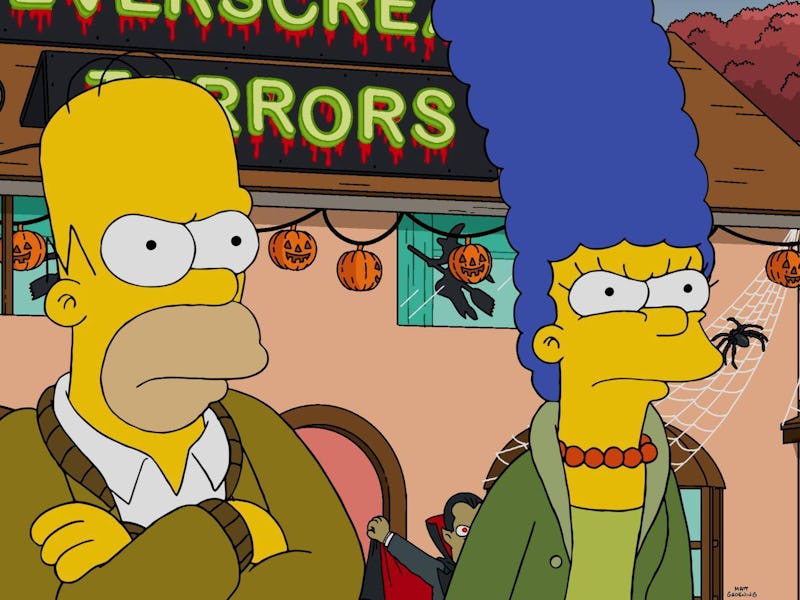Double the Halloween Episodes, Double the Trouble for 'The Simpsons': On 'Treehouse of Horror XXVI'
After a slightly more promising Halloween episode last week, "Treehouse of Horror" shows the deadly flaws of the nearly 30-year-old show.

For the first time this year — in its 27th season — The Simpsons doubled up on Halloween episodes. Last Sunday’s “Halloween of Hell” was a dense and unusually chuckle-inducing entry in a show that has been a patchy-at-best mess for 26-plus seasons now. “Halloween of Hell” featured some good Homer one-liners, and an effective turn from Apu selling Halloween merchandise. But it was also, weirdly enough, a half-hearted and largely non-supernatural Halloween episode, which illustrated the vaguely jaded tone the show has taken on in recent seasons. The Simpsons is now long past what one might have deemed the twilight of its tenure (the release of all the episode on FX streaming seemed to indicate a farewell) in some weird no-man’s-land. In a terribly depressing turn of events, Harry Shearer — who voiced nearly half of the show’s side characters — left the show in May, though some previously recorded episodes are being included in this season.
If “Halloween of Hell” is above average in terms of 21st century Simpsons, the “Treehouse of Horror” episode — the newest installment of the standard October Simpsons franchise, airing on Sunday — bounces right back in the other direction, illustrating exactly why the show is so troubled at this dreadfully late stage in its existence.
Though ratings are at an all-time low, upwards of three-and-a-half million people still tune into The Simpsons every week, and the show retains its basic form — its characters their ages and trademarks. But by now, an episode cannot pass without a smattering — or deluge — of meta-references, or some pointless breaking of the third wall. The half-jokes aren’t exactly fan service, though they masquerade as such. They evidence the show trying to spin humor out of the fact that it’s sick of itself. The definitive lack of anything near a new idea has in itself has become a main joke in Simpsons writing; Homer sleeping and tripping with Lena Dunham to the sounds of Spacemen 3 is the closest we get to an original thought these days.
This world-weariness is particularly extreme in franchise Simpsons episodes like “Treehouse”s. The selling point of the episode in ads has been the image of Sideshow Bob finally murdering Bart, which is the exposition for the first third of the episode: a corpse re-animation narrative in the vein of Frankenstein or Lovecraft. Where a Bart and Bob tête-à-tête used to be a self-contained episode type, here Groening and Co. rely on heavy self-referentiality, and collage past plot elements. Bob refers to the timeline of the show: “24 years of trying to kill a ten-year-old child have finally paid off,” Bob cries. When Bob gets hits in the face with his trademark broom, it feels like a metaphor for the patness and tediousness of the concept. His operatic singing to gramophone accompaniment couldn’t be less funny than his run-through of hits from Gilbert and Sullivan on the boat in Season 5’s “Cape Feare,” a series highlight.
The soulless rehashings of recurring gags continue throughout the episode. Most offensively, the writers manage to ruin one of the all-time best catchphrases in Simpsons history — “Everything’s coming up Milhouse!” — during a half-baked bit in which Springfield townspeople acquire superpowers from waste from the nuclear power plants, and Milhouse wills mutant versions of himself to spring up from the ground.
Before the credits roll, the camera pulls out to show alien overlords Kang and Kodos — two of the most beloved “Treehouse”-indigenous characters, who once masqueraded as Bill Clinton and Bob Dole — watching from their spaceships, like the two old men in The Muppets. “Once again, we just have a cameo!” Kang yells. As a joke, they are put in the old, box-like aspect ratio of ‘90s television, Kodos says, by way of a closer: “Just ‘cause it looks like Season 4 doesn’t make it Season 4!” The thought process behind this joke numbs the brain. It suggests that the tactic: If we acknowledge we’re bad, maybe people won’t call us inept anymore.
But that certainly is not the effect, and there’s no humor here. Instead, we feel like we, along with The Simpsons, are growing older — in the grand scheme of things, just waiting around to die.